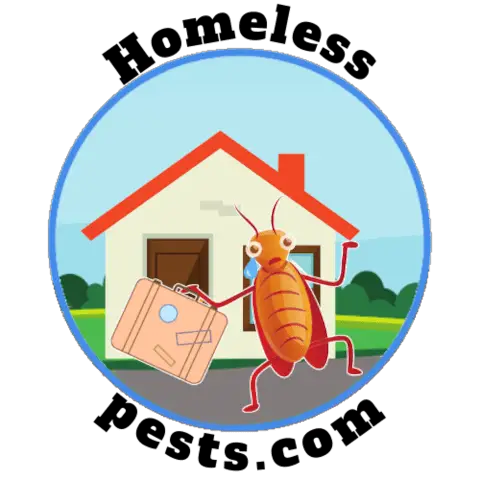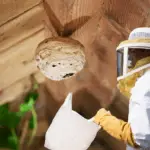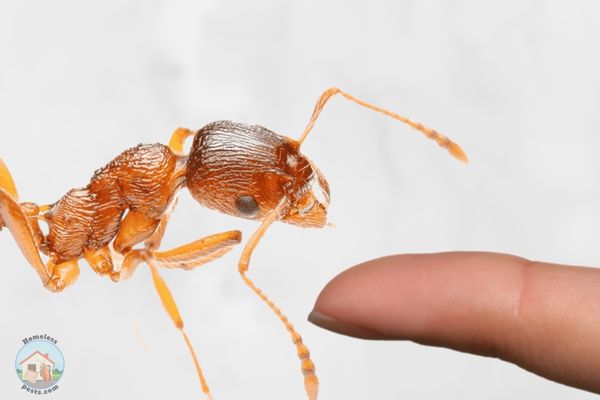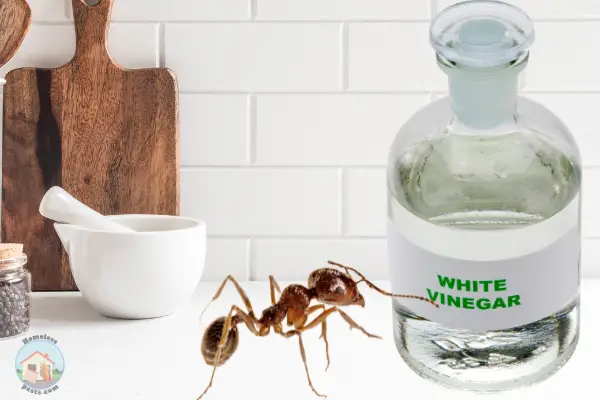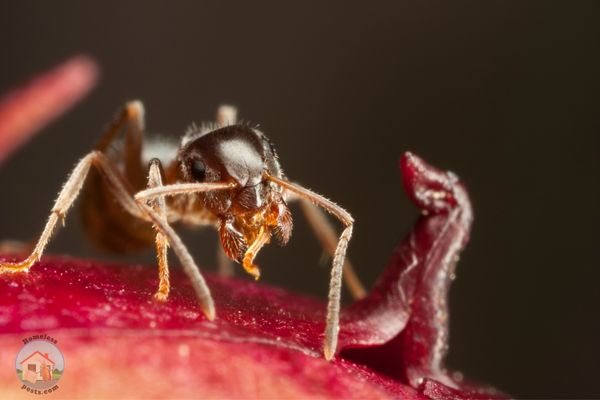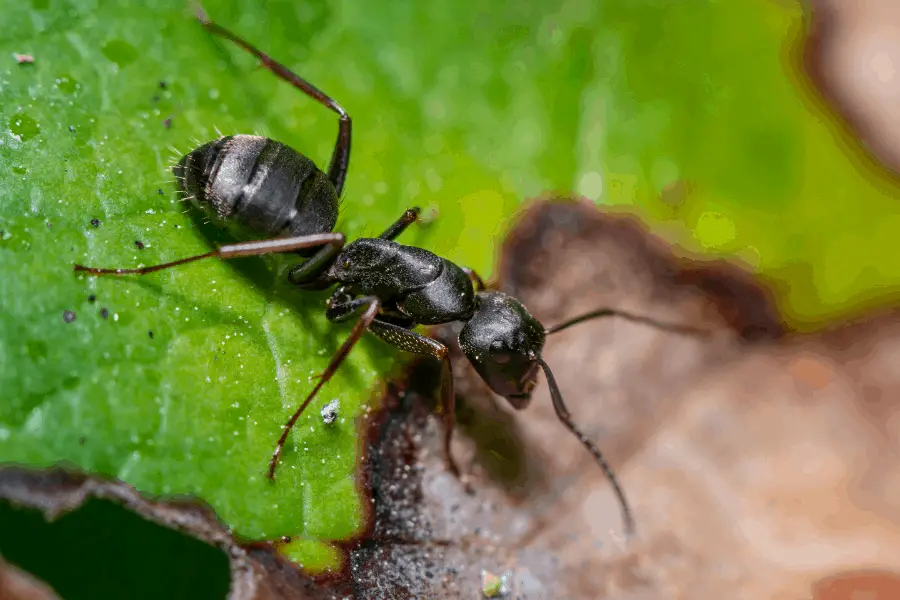
Ants are often found in yards, on sidewalks, and even in potted plants. They can be a nuisance to deal with because they not only chew on the leaves of your plants but also make it more difficult for them to grow. In this article, we will review some natural ways you can use to deter ants from staying around your home or garden without killing the vegetation that is so important.
The most effective way to get rid of ants is to use a borax-sugar solution which, when mixed correctly, will be foraged by ants and carried back to their nest compromising the entire colony. However, this isn’t the only option and there are some situations where a colony can be ousted without killing the ants themselves.
So, as there is more than one option that you might use depending on where the ants are and which plants you want to save, please continue to read to find out more.
The best natural ways to kill ants while saving your plants
There are several natural remedies for an ant infestation including the use of water, cinnamon, borax, citric fruits, and a liquid soap mixture (an eco-friendly one of course). The choice of remedy will depend on the size, location, and season of the infestation. Whether or not you are working with potted plants also dictates which cure you use.
Among the ant remedies that I’ll go over shortly, there are some which are designed to discourage the ants from staying and some which are designed to actually kill them outright. So, bear this in mind when choosing which method you want to go with.

Using water to deter ants
Using cold water can be quite effective in deterring an ant colony because it is a well-known fact that ants do not like being in contact with it, especially if it’s where they are building their ant colony. Flooding an ant colony will also often lead to the ants abandoning it as it will compromise the structure of their little ant mines.
When the ants realize that their home is being filled with water, the ones who don’t actually drown will swiftly move out and look for higher and drier land to start again.
I suggest using cold water as the first line of defense when fighting an ant infestation and use other remedies only if this one fails or is not suitable for your situation (e g., you are working with potted plants).
As you probably know, pouring too much water into a potted plant isn’t good for it. So, if you are exclusively dealing with potted plants, look at another method.
Using a borax paste to kill ants
If flooding doesn’t work in deterring them from staying in your yard, you can use a commercial product that contains borax as one of the ingredients which will actually kill the ants.
Borax, despite the alarming sounding name, is actually a natural chemical product found in laundry detergents, so it isn’t actually toxic for humans. it is however a great ant killer.
To use borax effectively it needs to be mixed with sugar or something sugary as ants are attracted to the sugar and will also ingest borax. However, you need to get the consistency right.
If the borax mixture is too powdery, the ants won’t be able to eat it. if the mixture is too watery they will drink it and die before taking it back to the nest.
So start with a thinner mixture and gradually add more borax until you get something like peanut butter.
So mix Mix half a cup of sugar, to one and a half tablespoons of Borax, and mix them into one and a half cups of warm water.
Using cinnamon as a natural ant deterrent
Cinnamon is often cited as a good natural deterrent for ants, but it will not kill the insects. Cinnamon was found under laboratory conditions to have some sort of repellent effect on the ants.
However, using household cinnamon may not be as effective as using an essential Cinnamon oil which is more pungent.
It is believed that the smell of cinnamon is repellent to ants, and they will not cross over cinnamon, which suggests it affects their pheromone communication system. However, you would need to put down a lot of cinnamon to really drive out the ants.
Using soap to deter ants
Making a combination of soap and oil into a solution can kill ants. This mixture weakens their exoskeletons and suffocates them, so this is an effective way to get rid of them. To get rid of ants, mix one tablespoon of liquid dishwashing soap with one and a half tablespoon of cooking oil. Pour the mixture into their nest for effective extermination.
Orange seed spray
Orange seed spray is a way to deter ants from coming on your plants. It is made with orange peels, water, and dish soap so it can be sprayed onto the leaves of a plant without harming them or damaging their health in any other way. You can buy this at most hardware or gardening stores.
What methods are best for potted plants?
If you are dealing with potted plants, the most effective methods to get rid of ants are probably using a borax mixture or the soap and oil method. Sprinkle borax on the ground around your plants in a circle. This will discourage ants from coming near them and ruining their health, without hurting anything else or leaving any residue!
I certainly wouldn’t recommend trying to flood an ant colony in a potted plant because it will drown the plant and you’ll have to start all over again!
What damage can ants actually cause to plants?
Until you’ve seen it, you probably wouldn’t think that ants could cause damage to plants but they certainly can.
The way in which ant activity destroys plants mostly comes from the construction of their nest. If an ant colony is nesting directly below a plant’s roots, it can dramatically reduce the amount of air and water that reaches its roots. This not only will kill a plant but also make them much more susceptible to pests or disease.
Also, ants can effectively bury plants, especially those in rockeries, while constructing their nests. If the plants are completely buried in dirt, they will not be able to breathe and this can lead to dead plants.
Some ants also have a fascinating husbandry behavior where they farm other types of insects. The ants eat a honeydew excreted by various insects such as mealybugs, scale insects, and aphids.
These other types of insects are the real pests for gardeners, but the ants will fight off their natural predators as long as they can use them as a source of food. Some aphids don’t make honeydew for ants and in that situation, the ants may actually eat them!
Despite this, when ants aren’t directly affecting your plants they are excellent for the garden as a whole. They help decompose dead material and provide nutrients for plants. Their burrowing can also help to aerate the soil (although it tends to make potted plants drain too quickly)
They also are very good at controlling other insects (the ones they don’t farm) that may be harmful to the garden or your potted flowers! So when you see an ant in a pot of soil, don’t automatically assume it’s bad – maybe they’re just looking out after their favorite plant.
How can you deter ants in the long run?
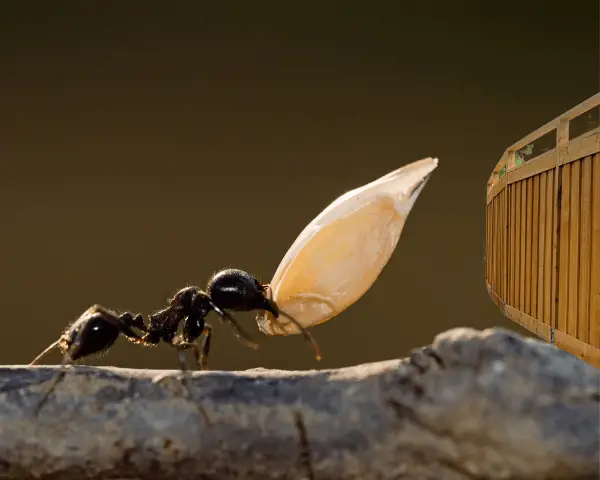
If you want to deter ants from your inside plants in the long run you should try a homemade repellent that is made from water, dish soap, and lemon juice. Mix these ingredients together in an old spray bottle or recycled ketchup container before spraying around the pots of plants to keep ants away!
You also want to make your home a terrible place for an ant to live by minimizing any food source.
You can do this by not putting any sweet drinks near your plants or on the ground, and also removing all food crumbs from under tables so ants don’t get a chance to eat. You should never leave out water as it will attract more insects!
What are some other pests that could endanger your plants?
The worst types of pests to have in your garden are slugs and snails. While they don’t always eat every type of plant, these pests will leave a slimy trail behind them which can cause rot on the surface of your plant’s leaves or stems!
Other pests which will ruin your garden are moles, gofers, and raccoons which will all dig up your plants while looking for food or shelter.
The best ways to get rid of these pests are by using plants that have been known for repelling them. These include asparagus, artichokes, and garlic!
There is also a pepper spray you can use on their trails if they leave one behind while looking through your garden bedding or pots with soil in it. These sprays work because the oils that make peppers spicy will stick onto any surface where an animal tracks its paws after having walked across this area

